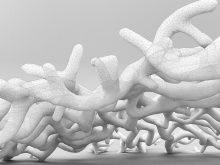Associative and Algorithmic Design
The seminar provides an introduction to parametric and algorithmic design techniques based on a practical learning of visual programming, such as Grasshopper. An algorithm is a finite sequence of explicit, elementary instructions described in an exact, complete yet general manner which implements in particular order to solve a problem. The application and execution of algorithms on a computer happens through programming languages, which enable computing procedure.
This is a fundamental property of computation as a technical achievement, but also as a theoretical framework for design. Computation has a profound impact on a contemporary understanding of architectural form, space and structure. It shifts the way one perceives form, the way in which form is purposed, and the way in which form is produced. The fundamental concepts which underlie computational theory and techniques expose form as a subsidiary component of environment, and environment as a complex web of influences.
This seminar will investigate the potential of algorithmic logics for computational design. It will provide a new method to explore spatial organization. Based on the CAD applications like Rhinoceros, the programming languages have been implemented in two different systems; Visual programming languages (VPL), such as Grasshopper, and textual programming languages (TPL), such as Rhinoscript and Python. Both Grasshopper and Python are relatively easy to learn but also a very powerful and versatile to explore parametric approaches of computational design.


